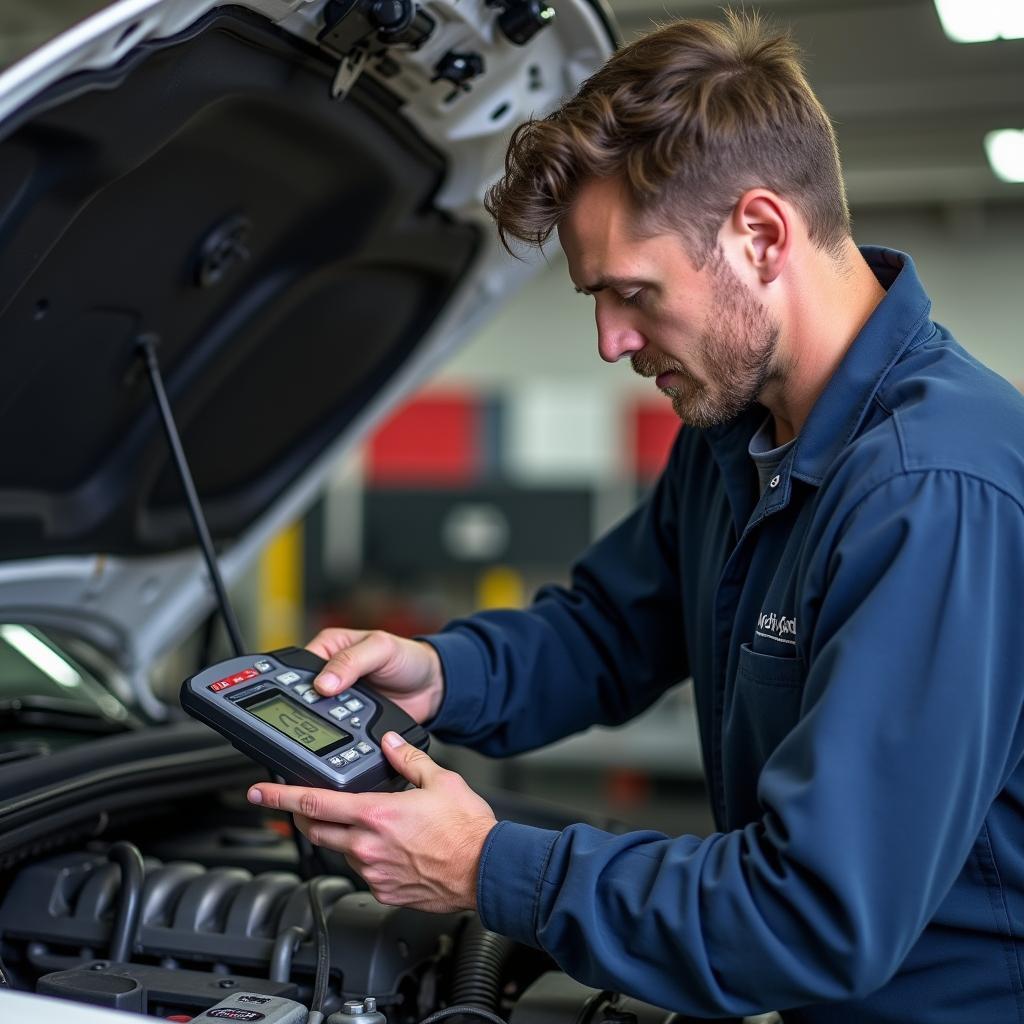Knowing how often to service your new car can be confusing. Between the manufacturer’s recommendations, your driving habits, and the advice you get from friends and family, it’s hard to know what’s best. This guide will clear up the confusion and help you understand the optimal car maintenance schedule for your new vehicle, ensuring it stays in top condition and retains its value.
Decoding Your Car’s Maintenance Schedule
Your car’s owner’s manual is the ultimate guide to its specific maintenance needs. It outlines a recommended service schedule based on time or mileage, whichever comes first. This schedule typically includes essential services like oil changes, tire rotations, and filter replacements. Don’t dismiss this valuable resource – it’s your roadmap to a healthy car.
Understanding the Difference Between Regular and Severe Service
Most manufacturers provide two maintenance schedules: regular and severe. “Regular” service applies to typical driving conditions, while “severe” service is recommended for vehicles subjected to more demanding situations. These could include frequent short trips, stop-and-go city driving, extreme temperatures, carrying heavy loads, or driving on dusty or unpaved roads. If your driving habits align with any of these scenarios, follow the “severe” service schedule to ensure your car gets the extra care it needs.
Why Sticking to the Schedule Matters
Regular maintenance isn’t just about keeping your car running smoothly; it’s an investment. By following the recommended schedule, you’re proactively preventing potential problems, extending the life of your vehicle, and preserving its resale value. Think of it as preventative medicine for your car.
Beyond the Basics: Factors Influencing Your Car’s Service Needs
While the manufacturer’s schedule provides a solid foundation, several other factors can influence how often you need to service your new car.
Driving Habits and Conditions
As mentioned earlier, your driving style plays a significant role. Aggressive driving, frequent braking, and stop-and-go traffic put more stress on your vehicle’s components, requiring more frequent servicing. Similarly, driving in extreme weather conditions can impact your car’s fluids and other parts.
Climate Considerations
Extreme heat or cold can take a toll on your car. In hotter climates, engine oil breaks down faster, requiring more frequent changes. Conversely, cold weather can affect battery performance and tire pressure.
The Age of Your Car
Even new cars benefit from regular check-ups. As your car ages, some components may wear out faster, necessitating more frequent service visits.
How Often Should I Change My Oil?
One of the most frequent and essential maintenance tasks is the oil change. While the traditional 3,000-mile interval is still cited, modern cars often have extended oil change intervals, sometimes up to 7,500 or even 10,000 miles. Always refer to your owner’s manual for the specific recommendation for your car.
What Happens if I Don’t Change My Oil?
Neglecting oil changes can lead to serious engine damage. Old oil loses its lubricating properties, increasing friction and heat, which can ultimately cause engine failure.
“Regular oil changes are the cornerstone of preventative maintenance,” says David Miller, Senior Automotive Technician at Miller’s Auto Repair. “It’s a small investment that can save you thousands in costly repairs down the road.”
Signs Your Car Needs Service Sooner
Even if you haven’t reached the recommended mileage or time interval, certain warning signs indicate your car needs attention. These include unusual noises, vibrations, warning lights on the dashboard, leaks, or changes in performance. Don’t ignore these signals; address them promptly to prevent minor issues from escalating into major problems.
Conclusion
Knowing how often to service your new car is crucial for its longevity and performance. While the manufacturer’s recommendations are a great starting point, factors like your driving habits, climate, and the car’s age can influence your service needs. Pay attention to warning signs and don’t hesitate to consult a qualified mechanic if you’re unsure about anything. By following a regular maintenance schedule, you’re investing in the long-term health and value of your vehicle.
FAQs
- How often should I rotate my tires? Generally, tire rotation is recommended every 5,000 to 7,500 miles.
- What’s included in a basic car service? A basic service typically includes an oil change, filter replacements (oil, air, and cabin), and a multi-point inspection.
- How can I find a reliable car service center? Ask for recommendations from friends or family, check online reviews, and look for certifications like ASE (Automotive Service Excellence).
- Is it necessary to service my car at the dealership? While dealership service centers are familiar with your car’s make and model, independent shops can also provide quality service, often at a lower cost.
- How can I save money on car maintenance? Look for discounts and coupons, compare prices from different service providers, and consider performing some basic maintenance tasks yourself, like checking fluids and tire pressure.
- What is a car diagnostic test? A car diagnostic test uses specialized equipment to identify potential problems with your car’s electronic systems.
- How can I tell if my brakes need replacing? Signs of worn brakes include squealing or grinding noises, a spongy brake pedal, or vibrations when braking.
Other Common Service Scenarios
- New Car Break-In Period: Some manufacturers recommend a specific service after the initial break-in period, usually around 1,000 miles.
- Seasonal Maintenance: Consider specific services for different seasons, such as checking coolant levels in the summer and battery health in the winter.
- Pre-Trip Inspections: Before long road trips, it’s a good idea to have your car checked to ensure everything is in optimal condition.
“Remember, preventative maintenance is always cheaper than repairs,” advises Sarah Johnson, Lead Mechanic at Johnson’s Auto Care. “Regular check-ups can catch small problems before they become major headaches.”
Further Reading
- Find more articles on car maintenance on our website.
- Learn about the latest car diagnostic technologies.
Need help with your car service? Contact us via WhatsApp: +1(641)206-8880, Email: [email protected]. We have a 24/7 customer support team ready to assist you.


